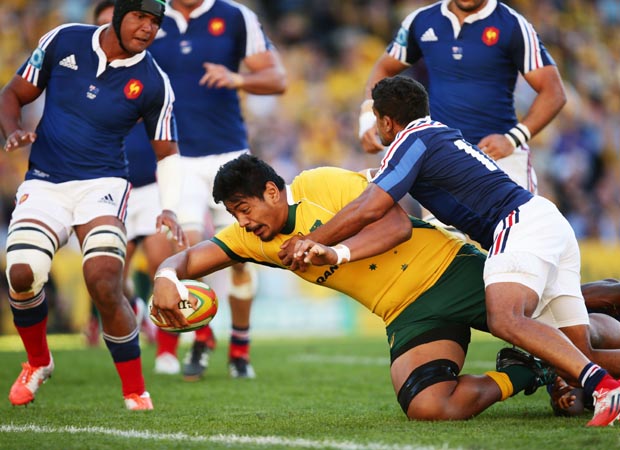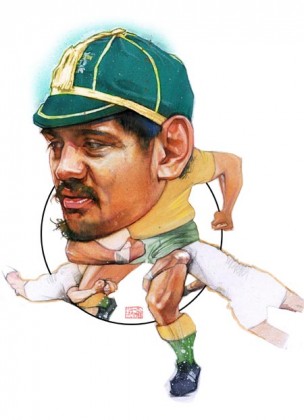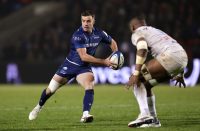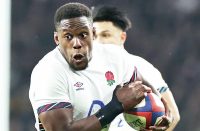 The Aussies are more inventive than most when it come to nick-names, and the one in the news most Down Under is the one coined for Will Skelton, the Waratahs lock who made his debut for Australia against France last weekend.
The Aussies are more inventive than most when it come to nick-names, and the one in the news most Down Under is the one coined for Will Skelton, the Waratahs lock who made his debut for Australia against France last weekend.
‘The Eclipse’ is the handle that former Wallabies hooker Brendan Cannon came up with after first getting an eyeful of the 6ft 8ins (2.03m), 22 stone (140kg) giant, and Skelton made such an impact with his first try-scoring, try-making incursion into international rugby that he turned the lights out on the lacklustre French.
The youngest Wallaby on the pitch at 22, and comfortably the biggest, Skelton played a sledgehammer role in the 39-13 demolition of the French as Australia strolled to a 3-0 series victory in Sydney.
Skelton’s early try was Brobdingnagian, with the huge newcomer carrying three Frenchman over the line as if they were Lilliputians before using one massive paw to plant the ball down over the line.
However, Skelton is not just about power as he showed with a delicate short pass which put Israel Folau over for a second-half try.
What makes Skelton such a formidable prospect is that he is a one-man driving maul who attracts tacklers, but also has the handling skill to put players through the gaps in the defence that he has created.
As Cannon put it, “He’s huge, and he can actually play the game. He has the most exciting potential of Australian second rowers in a long time.”
Little wonder that the New Zealanders were on a poaching trip a year ago when they sent Sir Graham Henry on a mission to try and woo the Auckland-born lock back to the land of his birth, with the promise of lucrative contracts with the Blues and the All Blacks.
However, Skelton, who arrived in Sydney with his Samoan parents when he was 10, turned Henry down having set his sights on Aussie gold.
The decision by Wallaby coach Ewen McKenzie to blood Skelton in good time for the 2015 World Cup comes as no surprise.
 I first saw Skelton play for the Waratahs last summer against the 2013 Lions, and despite a heavy defeat he put himself about enough to suggest that he is more grizzly bear than teddy bear.
I first saw Skelton play for the Waratahs last summer against the 2013 Lions, and despite a heavy defeat he put himself about enough to suggest that he is more grizzly bear than teddy bear.
Skelton says, “If I can throw the weight around, I will. I look at it like there are guys who are fast, and players who are strong. I’d see it as a waste of time if I didn’t use this gift as an advantage.”
By all accounts the big man has a pretty healthy work ethic, but, just in case there was any danger of him getting ahead of himself after last weekend’s dream debut, this week he found himself back on the Waratahs bench for their Super 15 clash with the Brumbies.
The Waratahs coach, Michael Cheika, explained his thinking: “He’s going to start coming up against a lot more challenges… against guys who know who he is and are going to try to get at him.
“So he is going to have to learn to deal with that extra attention – and I’m sure he will manage it. He has the demeanour for it, but experience is the best teacher.”
As for McKenzie, following a rough start in last season’s Southern Hemisphere Rugby Championship, he has remoulded Australia into a serious 2015 World Cup contender.
The Wallabies go into the 2014 Rugby Championship with not only a seven-game winning streak, but strike power up front as well as behind.
With England having failed to halt New Zealand’s world record winning run – the victory by Richie McCaw’s boys in Hamilton last weekend equalling the 17 match benchmark set by the All Blacks (1965-67) and South Africa under Nick Mallett (1997-98) – it is now up to the Wallabies.
Australia’s chance to halt the All Black march and create a new world order comes when the teams meet in Sydney on August 16, and, with the likes of Skelton judiciously grafted into the mix by McKenzie, they look more capable than England of doing it.
The warning signs are there for Stuart Lancaster and England that World Cup Pool A, which groups them with Australia and Wales, is going to be a huge test because the Wallabies are unrecognisable from the side eventually shredded by Warren Gatland’s Lions.
What is at stake for the team that comes second is a brutal route through the knockout stages, with South Africa and New Zealand on their quarter-final and semi-final card, or a more forgiving pathway featuring Scotland or Samoa, and Ireland, France or Argentina.
For the team that comes third in Pool A there is nothing but the exit door.
At this juncture it’s hard to see Skelton and company being the ones shoved through it.
*This article was first published in The Rugby Paper on June 29.























